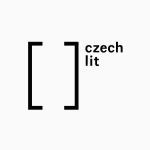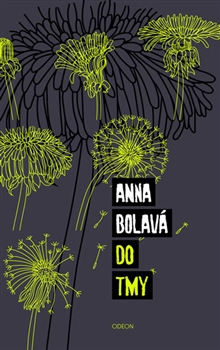Dozens of excellent books were published in the Czech Republic in 2015, all of which undoubtedly deserve to be translated and read abroad. In the next three monthly features we will present those we consider to be the most important books of the year, books which have been popular with readers and critics in the Czech Republic and which we believe will also appeal to international audiences. We begin this month with literary fiction, followed by books for children and young adults in March and genre fiction in April.
Contents
Petra Soukupová: Under the Snow
Anna Bolavá: Into Darkness
Chaim Cigan: Little Mr Talisman
David Zábranský: Martin Juhás or Czechoslovakia
Markéta Baňková: Triviality; A Romance in the Age of Genetics
Iva Pekárková: Roast Zebra
Roman Ráž: Spa Hopes
Ludvík Němec: Indulgences for the Next Night
Matěj Hořava: Distilled Spirit. Stories from the Banat
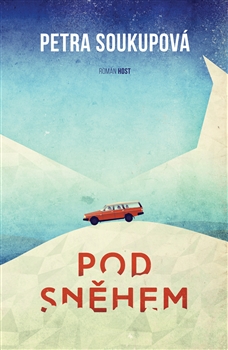
Petra Soukupová
Under the Snow
Pod sněhem
(Host, 373 pages)
Petra Soukupová is one of the most successful young Czech authors, consistently popular with readers and critics alike. Under the Snow, is caustic, ironic and highly readable prose about those universal themes — family and relationships. Soukupová is succinct and considers her words carefully. Her latest novel begins with a seemingly ordinary situation: one winter day three sisters get into a car and head for their parents’ place, where they will celebrate their father’s birthday. Daughters, a baby, a dog, an iPad and a hangover. Only a few miles into the drive the atmosphere grows tense and at this stage the sisters are unaware that more unpleasantness awaits them at their parents’ home…
Soukupová’s previous books have been published in Italian, Polish, Slovene, Bulgarian, Croatian and Bosnian and a Polish translation of Under the Snow is already in preparation. Although Under the Snow was published less than a year ago, it has already sold 15,000 copies and is expected to be nominated for the Magnesia Litera and Czech Book awards.
Praise
“By combining spoken words and thoughts and by switching characters — each of the sisters is a narrator — the author turns an ordinary story into a thrilling read. Every conflict — arguments about who sits where, a stop at a petrol station, changing a tyre — is seen from multiple perspectives.”
— Magdalena Čechlovská, iHned
Links
Author website: www.petra-soukupova.cz
Foreign rights: www.dbagency.cz
Publisher: nakladatelstvi.hostbrno.cz
An excerpt can be found here.
Anna Bolavá
Into Darkness
Do tmy
(Odeon, 232 pages)
What Anna Bolavá achieved with this book happens very rarely: Into Darkness is her prose debut, yet everyone agrees that it has none of the common shortcomings of first novels. Bolavá uses a proven mainstream technique: take a loner, an outsider with an unusual hobby (collecting herbs in this case), and skilfully transform this innocent pastime into a functional and profound existential metaphor. From the beginning, this story of a lonely, ill woman who has dedicated most of her life to collecting, drying and providing medicinal plants, has apocalyptic undertones. Despite the slow, seemingly dispassionate pace, a strange unease bubbles under the surface. The translation rights have already been sold to the Polish publisher Książkowe Klimaty and the book is sure to receive nominations for the most prestigious Czech literary prizes.
Praise
“Into Darkness is remarkably magical and powerful prose.”
— Petr A. Bílek, Respekt
“Anna Bolavá has managed to construct a dramatic tale on the foundations of one person’s story, the symbolism and straightforwardness of its plot resembles a modern myth.”
— Petr Nagy, iLiteratura
Links
Publisher: www.odeon-knihy.cz
-
Excerpt ▼
I take a deep breath and plunge into the tangle of trees. Each branch of the walnut tree is already slightly scarred. Either by me or by a cat. The beasts are everywhere that I can’t reach. They leap from branch to branch, emitting strange, shrill sounds. Sometimes they snarl somewhere very close by, but as soon as I turn around they’re gone. I rarely see them, so it’s impossible to count them. Here amid the branches they play a strange game which I don’t understand and which doesn’t seem to be a kind of amorous cat chase. It is more likely they’re all preparing to do battle. Perhaps they are chasing me, but I’m not going to worry about that. There’s only one thing I’m concerned about right now: filling my basket, maintaining my balance, not getting scratched and getting back down. And apparently I’m supposed to look after the cats! They never take their eyes off me, and it seems more like Marcela gave them orders to look after me. The black ones are the worst. You can’t see them and they definitely attack from behind. The white ones appear to be nice, they are fat, not so agile, and they hardly ever make a sound. But then they have those blood-red eyes. I can never look into them. They hypnotise me and could cause more damage than you’d expect. I won’t look at them, I’ll mind my own business. I climb down with a full basket and take the second one. All the time the feline creatures wail their insane songs until my head begins to spin. This is a conspiracy. Their cries pierce my head , issuing a challenge to the drug-subdued pain there. They want to gang up with it. And the pain goes along with it. It rises to the surface and spreads far and wide like an enormous exotic flower. One of those which you can’t pick. Because they offer no practical use, only destruction. However, I’m determined that I’ll fill the second basket, come what may. And I’ll even have enough strength to empty it out in the loft, I have a vent there which I leave half-open so it lets in fresh air. I can do it. After all, this is me.
(Translated by Graeme Dibble)
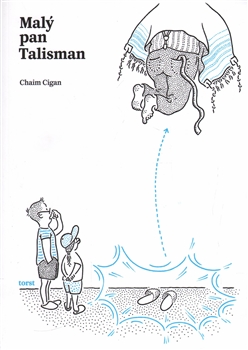
Chaim Cigan
Little Mr Talisman
Malý pan Talisman
(Torst, 160 pages)
Today we know that Chaim Cigan is the pseudonym of author and rabbi Karol Sidon. However when Altschulova metoda (Altschul’s Method), the first book to be published under this ambiguous name, came out in 2014, the search for his true identity became a major topic in the Czech literary world. While the aforementioned Altschul’s Method is part of an extensive tetralogy, our choice for this selection has a much more modest length. At the same time it retains all the features which make Cigan one of the most compelling contemporary Czech authors: fairytales for adults, neo-mythical stories, the supernatural, pop culture… Little Mr Talisman, with the help of a magic prayer shawl and prayer straps, is able to fly and help people who are unable to help themselves. You will find out a good deal about the Jewish faith, Jewish customs and Jewish mysticism and be reminded that things can often appear to be quite different from how they actually are, that good deeds do not always have to turn out well, and that it is better to look at everything from several perspectives.
Praise
“Unlike pre-war Jewish folklore, preserved thanks to many excellent writers, Little Mr Talisman is undeniably contemporary.”
— Marek Toman, MF Dnes
“Jews also have their superhero who helps them in times of need. And it’s not golem. It’s Mr Talisman. (…) The informal approach and understanding of minor everyday troubles, whose nature is generally tragicomical, resembles Karel Čapek’s storybooks.”
— Pavel Mandys, Hospodářské noviny
Links
Author website: www.karolsidon.com
Publisher: www.torst.cz
-
Excerpt ▼
In the English city of Birmingham there lived a tailor by the name of Mr Talisman. He had a tailor’s workshop on the first floor of a grand building that belonged to him – right on the main street, if you please, though not in the centre – and a shop on the ground floor. If someone had their clothes made at Mr Talisman’s, it meant that they were a better class of people.
The Talismans had one son, Augustin, but only in a uniform in a framed photograph, because many years before he had been eaten by a leopard in Africa. That was perhaps the reason why Mr Talisman loved children so much, although Mrs Talisman could not stand the sight of them for the same reason. She looked after the shop and practically never went into the workshop, and if it was necessary to measure any girls over twelve years old for a dress, one of the seamstresses would do it.
When clothes were being made for children, the whole family would set off to the tailor’s. It looked like a trip to the doctor’s or to the photographer’s. However, this trip was a much more pleasant one. Although the children had to stand up straight as if they were at the photographer’s and not fidget when Mr Talisman was measuring them or trying new clothes on them, he then gave them some chewing gum as a reward. He was also referred to as little Mr Talisman because he was small in size, like a large baby.
(Translated by Graeme Dibble)
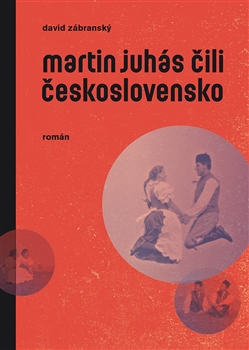
David Zábranský
Martin Juhás or Czechoslovakia
Martin Juhás čili Československo
(Premedia, 570 pages)
Have you ever read a story about a boy who would from time to time take trips into the wide world while still inside his mother’s womb? And what if these trips influenced world events? Zábranský has written a book which provoked a lot of discussion last year and has received many enthusiastic reviews. This lengthy novel skilfully combines many types of storytelling: reviews have compared it to Rabelais and Sterne but also Márquez and Latin American magic realism. The setting is however in southern Bohemia instead of Márquez’s Macondo. The founding of Czechoslovakia, the Great Depression, collapse of Czechoslovakia, World War II, expulsion of Germans, another Czechoslovakia, we watch all this from the perspective of small-town heroes. However, the local settings and events only serve as a backdrop for universally understandable humour. “You aren’t reading a report about the past. You are watching a narrator-illusionist, who is trying to assemble a suggestive whole from individual characters, places and events […] without feeling the need to address the fact that certain elements are from the real world, others are derived from myths and some are pure phantasmagoria,” writes Petr A. Bílek in his review for the Respekt magazine. Zábranský already has one Magnesia Litera award and we can expect at least a nomination for Martin Juhás.
Praise
“Zábranský’s new, weighty and playful novel stands out as an exceptional and remarkable work — even when we consider it in the context of the last twenty years of Czech literature. […] The novel is a lavish feast of different types of storytelling. Reminiscent of Rabelais, Sterne, Vančura but also Márquez and the whole of Latin American magic realism.”
— Petr A. Bílek, Respekt
“Martin Juhás or Czechoslovakia is a great novel. I’m not afraid to say that it will become a significant milestone in the development of historical literature.”
— Marek Dobrý, Lógr magazín
Links
Email: zabranskydavid@gmail.com
Publisher: premedia.sk
-
Excerpt ▼
Just a few days after meeting the love of his life, Reitmajer the architect met with great misfortune: one summer’s evening in the year of our Lord 1921, while lying on the grass beside the Štěkeň weir, he was kicked right in the balls. Those responsible for this act were a group of flirtatious, pot-bellied little communists covered in blood, vomit and ice cream, envious examples of “le petit communiste”. It was “coitus interruptus radicalis”. (Coitus interruptus was Judita’s condition sine qua non if she were to sleep with Reitmajer at all; the condition of sine qua non copulare, we might perhaps say, so that if the interruption could come about in a different, less painful way… And so on). First of all the communists kicked the architect in the head and then between the legs.
At the hospital in Strakonice, which Reitmajer and Judita got to on the back of a brewery truck that was returning from delivering beer to the surrounding villages, the doctors examined Reitmajer and told him that he would never be able to have children. But as for erectile function, that should remain the same.
Although Judita never once visited Reitmajer in hospital, the architect’s interest was undiminished, and no sooner had the doctors allowed him to go home than he was trying to win over Judita again. He posted a crazy note in her letter box in Baar Street telling her, without a hint of self-esteem, about his new indisposition or rather disposition. “Indisposition or disposition? It depends how you look at it!” were Reitmajer’s exact words. “It would definitely be an advantage for you. I’ll never be able to, or have to, depending on how you look at it, have children, Judita!”
What was Judita supposed to say to that? “That guy’s crazy, Muffi,” explained the beautiful woman to her dog, promptly throwing Reitmajer’s note in the bin.
One morning in November, Reitmajer finally ventured through the gate into Judita’s garden. Judita quickly opened the window and shouted into the garden: “Lunatic! Lunatic! Impotent! Impotent!”
(Translated by Graeme Dibble)
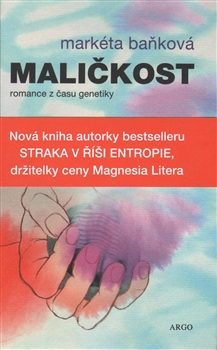
Markéta Baňková
Triviality; A Romance in the Age of Genetics
Maličkost; Romance z času genetiky
(Argo, 256 pages)
Markéta Baňková is a cosmopolitan, cultivated author who is also an audiovisual artist and graduate of graphic design and new media from the Academy of Fine Arts in Prague. Straka v říši entropie (The Magpie in the Realm of Entropy), her debut collection of fables, won a Magnesia Litera award, was nominated for the Josef Škvorecký Award and has been translated into Polish. In Triviality, Baňková again combines prose with scientific themes which shape and illustrate the story. This time her topic is biology. Hidden under the mask of black humour is an examination of human identity, a puzzle which is especially pertinent with new discoveries in genetics and the associated question of free will. Are we slaves to our genetic makeup? Are our thoughts influenced by parasites? Or does the society we grow up in have the greatest influence? The main character, Tomáš, a genetics student raised by adoptive parents, is searching for his own roots. Science forms his worldview, but this lens can distort his personal, especially romantic, relationships…
Praise
Picked as one of the best books to buy for Christmas by the editors and reviewers of the Respekt magazine.
Links
Author website: www.bankova.cz
Publisher: www.argo.cz
-
Excerpt ▼
NOW
When I was about ten, they began to leave me alone in the evenings. They would kiss me goodnight and go off to visit somebody. I would lie in bed, looking into the darkness. The shelves with the boxes, the suitcase on top of the wardrobe and the dressing gown on its hook seemed bigger in the dim light. Quietly expectant. But I wasn’t afraid. I waited until the garden gate clicked shut and the voices from the street grew faint. The barking from the neighbours’ gardens accompanying my parents’ steps died down. I sat up. I listened to the ticking alarm clock and the roar of blood in my head and I felt the seconds passing until the time when my parents would return home.
I was looking forward to it, and yet at the same time I wanted to hold onto this moment. Not that it was more important than other ones. But I had it all to myself. And so I tried to engrave it into my memory in as much detail as possible. Today – though slightly blurred – it is still there: a child’s bed in a dark room, a car occasionally passing by the window and projecting moving strips of light onto the wardrobe. They would appear, expand, freeze for a moment, abruptly slide at an angle onto the walls, and the room would once more be plunged into darkness. Outside a solitary bark could be heard, soon joined by others from the southern part of the village, and then barking began to sound from the east, the north…all the dogs loudly demarcating the borders of their village territory at once. And I made up my mind: “I must remember this moment all my life.”
Time. I think about it, but not like other people who only complain about the lack of it. It fascinates me. I move my fingers through the gloom, as if it were possible to catch hold of the present disappearing into the past. Even now I still try to do it through my memory or I use a camera to help me. But no matter how hard I try, the next second NOW is gone.
Mind you, I could happily have done without the NOW of this Saturday morning. The floor was swaying and in the half-blind mirror of the chipped bathroom cabinet I saw a familiar, somewhat weary face. I shuffled back from the bathroom to the bedroom. In the next bed a pair of socks were sticking out from the duvet; I used to enjoy making fun of the holes in them, which revealed the toes, but now I was keenly aware of their festering odour. The three bare toes of Stinker, a maths/phys student, protruded from the holes like a monument to our grubby coexistence.
Three years in a shared room in a hall of residence. It was just as well he was away a lot. Resigned, I breathed in. I’d already given up on speeches calling for hygiene to be maintained. The female visitors who we never ceased to hope would come round might have thought he was no longer alive and had begun to decompose, especially as he spent so much time lying around in bed. No, don’t think about how much worse he would smell if…
I lay down. A waterfall of images tumbled beneath my closed eyelids:
A girl’s pale neck in the flickering light of street lamps. A heavily made-up Frog describing the details of a love triangle. The clumsy movements of a drunken Martin. The plait of a girl’s legs on a seat.
The deep rumble of the bar.
“So tell me about the party!” Stinker sat up in bed and put on his glasses. “Dish the dirt!”
(Translated by Graeme Dibble)
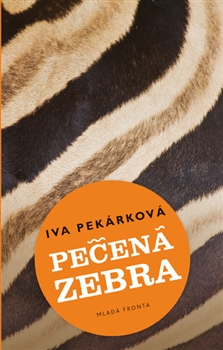
Iva Pekárková
Roast Zebra
Pečená zebra
(Mladá fronta, 272 pages)
Pekárková studied microbiology in the Czech Republic but emigrated in 1983 shortly before she graduated. She travelled to the United States, where she had a number of jobs, including bartending, social work and taxi driving in New York City. In 1997 she returned to Prague, but then left again in 2005, this time to London. “Her move into exile gave rise to the major themes in the author’s work: the position and perspective of a foreigner, a person’s ‘multiple’ identities after leaving home, and the fundamental need to understand ‘the other’ (person, town, country, culture, events),” was how academic Vladimír Novotný characterized Pekárková’s work which has been translated into English and German.
Czech literature has very few voices covering multicultural topics based on extensive experience. What we value most in Roast Zebra is its insight and skilful writing; Pekárková wants to communicate a message. Her prose is succinct, witty, impartial, she writes with a light hand. In this novel she writes about a modern-day phenomenon no-one has yet written about, that is, ‘black-and-white’ relationships within the Czech Republic. She knows what’s going on in Prague streets and nightclubs as well as in sleepy Czech towns whose inhabitants may never have seen a ‘live’ black man. All of her protagonists are based on real-life characters with one thing in common: their partners of choice are black. In dashes of black and white, as well as many other colours, Iva Pekárková describes their destinies with both depth and humour.
Praise
“It’s as if Pekárková wrote with her body, her own senses, instinctively. Her writing is full-blooded, mighty.”
— Radim Kopáč, iDnes
Links
Foreign rights: www.praglit.de
Publisher: www.mf.cz
-
Excerpt ▼
Veronika’s first child was always laughing. She would push the pram around the streets, through the park, awkwardly manoeuvre it onto the tram (she always hoped that there wouldn’t be some well-meaning, clumsy type waiting at the stop, who would grab hold of the pram, almost tipping the child out, and insist on “helping her to get on”, continuing to do so until the tram left with an irritated ring of the bell) — and a loud baritone laugh could be heard from the pram. Veronika’s first child was like one of those toys that roar with laughter when you press a button. Strangers — passers-by in the street, old grannies in the park, passengers on the tram — would turn towards the sound, and after a moment’s hesitation the penny would drop and they would smile at both of them, and some of them would even burst into hearty laughter like Veronika’s child. That was all it took for somebody to give the two of them a dirty look. (That is, assuming they hadn’t seen Veronika’s child.)
Veronika’s child laughed when she brought him to her breast and almost choked with laughter in a torrent of milky bubbles when she burped him on her shoulder and then put him down in his cradle, that is the wicker dog basket with the pawprint design on the upholstery, because it was cheaper than a cradle and since she was young Veronika had always been accustomed to buying what was cheaper.
Veronika’s child laughed when he lifted his head in the cradle, and laughed when he was learning to take his first steps and all of a sudden sat down on his bottom. Veronika couldn’t help herself: she laughed along with him. She laughed when he threw up on her shoulder after he’d been fed, she laughed when she turned him over in the cradle with the pawprint pattern, and later she laughed when she picked him up out of the dust and blew on his knees. Veronika laughed her way through Ikenna’s early childhood. It was wonderful, just wonderful.
But other things weren’t so wonderful.
(Translated by Graeme Dibble)
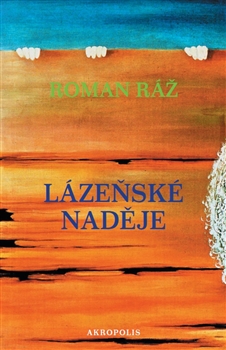
Roman Ráž
Spa Hopes
Lázeňské naděje
(Akropolis, 432 pages)
Roman Ráž is an author from the older generation of Czech writers (b. 1935), who has experience not only as a prose author but also as a radio, television and film scriptwriter. His books have been published in Polish, German and Romanian. Spa Hopes is the second part of a planned trilogy of novels which follows the fates of one family in Slaňany, a Moravian spa town, over the course of the 20th century. Ráž explores the strained relationship between the Czechs and the Germans, while steering clear of painting a black and white picture. He allows a Sudeten German woman to report the horrors of displacement and he does not hide the love between his Moravian cousin and a young man from the Hitler Youth. Ráž portrays the epoch free from any partiality, with a proven mixture of memories, newspaper reports, letters and diary entries. The first volume of the trilogy, Lázeňské dobrodružství (Spa Adventures), in which Ráž focused on World War I and the following three years of battles between the left and the right over the new Czechoslovak state was nominated for the Josef Škvorecký prize.
Praise
“[Ráž] refutes the comfortable division into killers and victims, as well as rejecting collective guilt. Take, for example, Hitlerjugend member Rolf, who moves into a small hotel in Slaňany towards the end of the war: he lost his entire family because of Hitler and his gentlemanly behaviour is clearly influenced more by his spontaneous love for the granddaughter of Maria Klánská than his mandatory loyalty towards the Führer. When he takes off his uniform to go swimming, it’s suddenly not at all clear what side he’s on.”
— Radim Kopáč, UNI
Links
Foreign rights: www.praglit.de
Publisher: akropolis.info
-
Excerpt ▼
Come evening, the front pages of all the newspapers will be describing the triumphant journey of Carol II through the streets of Prague and no one will notice that I’ll miss my train because of this spectacle.
I frantically consider my options.
I won’t return to Kateřina. It would only cause confusion. One should not say farewell twice. I’ll find out when the next train leaves and go to Fanta’s Cafe. I’ll spend hours there, but what does that matter?
I should also send a telegram to Tomík about my late arrival. Maybe they will deliver it to him, maybe not, they probably won’t catch him at home. Who knows where he will be when he finishes work in the shop? I don’t suppose he returns home when I’m away, let alone stays there with his model aircraft or to play the piano. He’s sure to be making full use of my absence and enjoying his leisure as he pleases.
But what does please him? What can he be doing?
I’ve had similar questions a couple of times now. Was it out of fear for his safety? No, there is certainly no danger for him in Slaňany. What does he actually do in his free time? He can’t be visiting the Balcar’s that often!
“They say he’s the last European gentleman,” the chauffeur smirks.
He interrupts my thoughts.
“Who?”
“The Romanian king! Or was it his son? I read the other day that he has transformed Bucharest into the Paris of the east. He made some sort of boulevards there. They’d be handy here right now. Prague is still a provincial town. Vienna on the other hand…!”
I stop listening. I know what Vienna is. But I don’t know what Tomík is doing in Slaňany.
Then the car finally starts moving. We are approaching the National Museum. The pavements are even more packed, crowds of people line the streets, the open windows of houses are full of faces. We move closer.
“Come, madame, we can’t continue, we’ll have to wait until he passes.”
The chauffeur is already outside and opening the car door for me.
At first I get out slowly, then I move faster, the excitement has got to me too, I’m deafened by screams, shouting, cheers, I stand on my tiptoes to see over the tangle of waving people and I see him!
Dressed all in white, he looks amazing, medals and decorations glitter on his chest, it feels like I’m watching a famous actor, he crosses the square, greets us from his open car with a raised arm…
Simply a king!
Then his vehicle disappears and we hastily return to the taxi. The chauffeur starts the car, blows the horn, pushes slowly forward through the street, two policeman in white gloves stop pedestrians to allow him to pass, yes, taxis always have the right of way a taxi driver once explained to me, after all, their job is to get people to their destination on time.
Another policeman is literally hurrying us along, it looks like I may still catch my train…
“Well, that agreement of ours is small, but we should be grateful, even though Yugoslavia and Romania aren’t exactly great partners, destroying them would be as easy as einz zwei drei for Hitler and his Wehrmacht, but it’s better than nothing. Did you know that Carol is offering us a million soldiers?”
“What for?” I ask without paying much attention, I’m looking at the large clock on the Wilson Station tower, if I hurry, I’ll leave on time!
“For our defence, in case Hitler wants to include Czechoslovakia in that Lebensraum of his.”
“Oh, I see,” I say, “how much do I owe you?”
(Translated by Jack Coling)
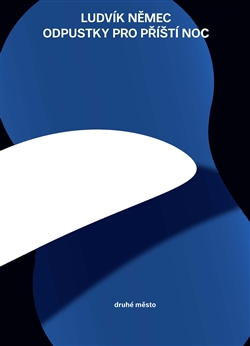
Ludvík Němec
Indulgences for the Next Night
Odpustky pro příští noc
(Druhé město, 208 pages)
Ludvík Němec’s writing is characterised by its refined, polished style. The short stories in Indulgences for the Next Night are a serious and intimate look at men and women: When they meet, how many people really meet? How many beings are with us during our most private moments, are they always alive and are they necessarily human? The characters of Němec’s stories seek answers on the boundary between real and imagined worlds. They are looking for forgiveness, whether in the form of new love, new life, or at least an understanding of their current existence. “The short stories often revolve around relationships, sex and romantic betrayal. In the first, a dead lover returns at Christmas to help the ageing main character remember that the end of their relationship wasn’t as clear as he had believed for years. The unreliability of memory is a brilliant theme,” writes Klára Kolářová in the Právo newspaper. For his previous collection of short stories, Láska na cizím hrobě (Love on a Stranger’s Grave), Němec was nominated for a Magnesia Litera award. His latest collection has already been nominated for the Josef Škvorecký Award and we expect more nominations in 2016.
Praise
“Indulgences for the Next Night contains texts which combine the playfulness of postmodernism with a depth of meaning. ”
— Kryštof Špidla, Host
“[Indulgences for the Next Night] offers masterfully narrated stories full of ideas and storytelling inventiveness, reading it reminds us of times when writing was done ‘by hand’, slowly and carefully.”
— Petr A. Bílek, Respekt
Links
Publisher: druhemesto.cz
-
Excerpt ▼
“And what did the guy say?”
“You wouldn’t believe it.”
“He slapped her about a bit?”
“No. He turned bright red and then even wished me a merry Christmas.”
“Unbelievable.”
“It’s the anabolics these Rambos take. That crap makes them emotionally unbalanced, sometimes even impotent, some actually end up with a slightly changed sexual identity.“
“What a great topic for Christmas eve. What do you take?”
“You know. Cipralex.”
Which is a third generation antidepressant. Kamil has been using it for over a year now and really feels better. Feeling everything a lot less helps. He isn’t even gaining as much weight as he did with all those previous pills. Although he gave up on trying to reach his former weight — now almost one hundred and ten, before, just over ninety — a long time ago. That’s another advantage of these antidepressants. You painlessly give up on a lot of things. They should be pouring it into the water supply, he thinks. Soon they’ll have no other option anyway. That’s my worldview.
“You shouldn’t smoke weed with it, should you?”
“I found online that it’s only dangerous with ecstasy. And since when do I smoke? I wouldn’t even know how to buy it! That pinch of weed with the son is just a family ritual. Once a year at Christmas.”
“I think that’s even worse. You smoking together.”
“Besides, I was hoping the weed might help with the loss of libido antidepressants are meant to cause. What do you say? Can’t you give me… at least a chance? Once a year at Christmas?”
But Monika only shakes her head. A rather beautiful head, outside and in. And she smiles gently, really gently. As if she was smiling at a pet, thinks Kamil. As if she was smiling at a golden retriever?
“Just don’t force yourself, because then you’re even more depressing. Pehaps you should have arranged that kind of Christmas present with the girl in the car. She might have given you something for that dumpling.”
“Now that you mention it, she actually said that that’s her name. Darja — like dáreček, a present.”
“Well that was probably a sign. Like a Christmas star.”
“She wasn’t much of a star.”
“And you’re not much of a biblical king. If it was for medical reasons, maybe I wouldn’t even mind.”
Kamil, however, feels a sudden longing for the days when she used to be jealous. When she still cared for him. That’s why he says impulsively:
“Remember, once, how you threw food out of the window because you were jealous?”
“What are you talking about? How much have you smoked?”
But from his wife’s expression he can tell that she’s remembered. She’s become alert. Kamil too. Suddenly neither of them know how much venom this ancient snake still has — a story slithering through the high dry grass, which was once temperate pasture — in its fangs.
Sssss!
(Translated by Jack Coling)
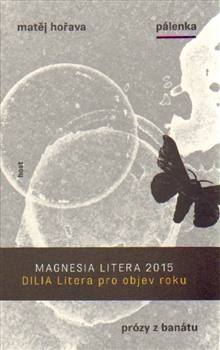
Matěj Hořava
Distilled Spirit. Stories from the Banat
Pálenka. Prózy z Banátu
(Host, 124 pages)
Although Distilled Spirit came out at the end of 2014, the reactions to this debut collection of short stories mean it undoubtedly deserves a place in our selection. It is already certain that Distilled Spirit will be published in Poland (Książkowe Klimaty) and Bulgaria (ERGO) and more translations are sure to follow. Although the book’s subtitle, Stories from the Banat, is a clue to its themes, these stories are not an escape to exotic locations or nostalgia, they are a natural combination of the present with the past, the domestic and the foreign. Ondřej Horák captured this succinctly in his review for the Hospodářské noviny newspaper: “Matěj Hořava shows that Central Europe, to borrow an advertising slogan, can still be lived to the fullest.” The text transports us to the remote mountains above the Danube and into the small villages in the Romanian Banat where Czechs have lived for over two centuries. A young Czech teacher arrives in one of these villages to forget, but the everyday reality of rural life and his timid attempts to integrate into this closed community are gradually overshadowed by intrusive memories brought about by the isolation and loneliness: bitter years spent in a grammar school gym, the solitude of different shores and journeys, people’s faces, fleeting moments of closeness…
Praise
“[Hořava’s] prose debut is a true revelation. […] Matěj Hořava is a poet in prose who shows what literature can do without the need to be literary.”
— Ondřej Horák, Hospodářské noviny
“I venture to say that a debut like thirty-five-year-old Matěj Hořava’s Distilled Spirit hasn’t come along in Czech literature for many years. It is a wonderfully concise, finely honed work in which every word has its place like a piece in a dry stone wall, making it reminiscent of the prose of Čep, Durych and Vaculík. The rhythm created by the laying down of individual words, and also by complete ‘diary entries’, enters the bloodstream to addictive effect.”
— Petr A. Bílek, Respekt
Awards
- 2015 Czech Book Award
- 2015 Magnesia Litera – Discovery of the year
Links
Foreign rights: www.dbagency.cz
Publisher: nakladatelstvi.hostbrno.cz
An excerpt can be found here.
[ ]
